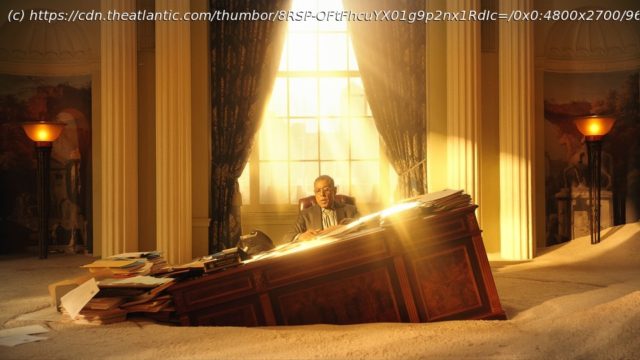The director’s fantasy of film’s technological potential is still far from a reality.
While working on his latest film, Megalopolis, Francis Ford Coppola had an idea: What if viewers interacted with the movie itself? He’d have microphones placed throughout audiences at every screening, so that at a predetermined moment, everyone who wanted to could ask the characters a question—and someone on-screen would respond. It would bridge the gap between fact and fiction. It would prove that cinema-going could truly be a unique experience.
And it would have worked, the director told me at the Toronto International Film Festival earlier this month, if he’d found someone to help make the technology work. Coppola had done everything else to create the experience: He’d come up with questions he anticipated people would want to ask—such as how the characters were feeling or what they wanted to do next—and he’d composed different answers to each one. He’d then filmed his cast reciting the responses he’d written. He even started collaborating with the programmers behind Alexa, Amazon’s AI assistant, on a mechanism that would process audience members’ queries and play a clip with the most appropriate reply. “If you went to the movie every day for a week, and you saw it seven times, every time would be different,” he said. “That was the intention originally, and we shot it that way.”
But producing the now-notorious scene, as film-festival attendees can attest, didn’t go according to plan—and not much else has either, when it comes to Megalopolis’s rollout. Lionsgate, which signed on to distribute the film weeks after its world premiere, at the Cannes Film Festival, had to pull a trailer that used fabricated quotes from critics about Coppola’s best-known work, such as The Godfather and Apocalypse Now. In July, Variety reported allegations of his on-set misconduct, including trying to kiss extras. (Coppola denied the allegations and has since filed a libel lawsuit against Variety.) Box-office analysts have forecasted the film flopping. And Amazon left the project during production, leaving Coppola no choice but to diminish the interactive theater component into a single, scripted exchange.
When we spoke, Coppola didn’t sound rattled by how wide the gulf between his aspirations and their execution had become. Instead, he saw such obstacles as inevitable for a maverick filmmaker. “Cinema is something that keeps changing,” he said. “Yet whenever you try to change it, everyone says, ‘Well, it’s not supposed to be like that.’ So we have to be much more accepting of films that we see that are different than the films we’re used to.”
Megalopolis, though, is a lot to accept. The film, out in theaters today, imagines 21st-century New York City as a retro-futurist Roman empire, in which a visionary architect, Cesar Catilina (played by Adam Driver), attempts to transform New Rome into a utopia using a space-time-altering material he invented called “Megalon.” The city’s mayor, Franklyn Cicero (Giancarlo Esposito), doubts Cesar’s ability to pull this off, but his socialite daughter, Julia (Nathalie Emmanuel), sees promise in Cesar’s work.






